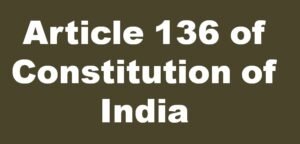Article 136 of Constitution of India : Special Leave Petition before Supreme Court
Article 136 of the Constitution of India
Article 136 of the Indian Constitution grants the Supreme Court of India the power to grant special leave petition (SLP) against any judgment, order, or decree passed by any court or tribunal in the country.
This article talks about one of the most important provisions in India’s judicial system because it empowers the Supreme Court to ensure justice even in cases where no direct appeal is available.
What is Article 136 ?
“The Supreme Court may, in its discretion, grant special leave to appeal from any judgment, decree, determination, sentence or order in any cause or matter passed or made by any court or tribunal in the territory of India.”
Scope and Significance of Article 136
Discretionary Power of the Supreme Court
Unlike ordinary appeals, the power granted under Article 136 is discretionary. This means that the Supreme Court may refuse to hear any petition filed under this provision.
It only grants special leave if the case involves substantial questions of law, gross injustice, or a violation of fundamental rights.
Wide Jurisdiction
Article 136 covers all courts and tribunals in India. However, it does not apply to military tribunals and courts-martial (as held in various Supreme Court judgments).
Exceptional Nature of Special Leave Petition (SLP)
A Special Leave Petition (SLP) under Article 136 is an extraordinary remedy. The Supreme Court does not act as a regular appellate court but intervenes only in cases of serious injustice or legal errors.
Judicial Interpretation of Article 136
The Supreme Court has provided various interpretations of Article 136 in landmark cases:
Pritam Singh v. State (1950) – The Court held that Article 136 does not confer a right to appeal but a privilege to seek leave to appeal.
Durga Shankar Mehta v. Raghuraj Singh (1954) – The Court clarified that this Article applies to all judicial bodies, including tribunals.
Procedure for Filing a Special Leave Petition (SLP)
A party seeking special leave to appeal must follow these steps:
Filing an SLP in the Supreme Court – Within 90 days of the judgment or 60 days in case of criminal matter judgments.
Preliminary Hearing – The Court examines whether the case deserves special leave.
Grant or Denial of Leave – If granted, the case proceeds as a regular appeal.
With respect of criminal appeal in the supreme court where police investigation is faulty, an accused may avail this remedy through criminal lawyer in Delhi.
Limitations of Article 136
Despite its broad scope, Article 136 has certain limitations. Advocates in Delhi practicing in supreme court easily tell about the limitation of SLPs.
Not an Automatic Right
The Supreme Court may refuse to grant special leave in every case.
High Threshold for Acceptance
The case must involve substantial legal questions or manifest injustice.
Cannot be Used as a Substitute for Regular Appeals
It is an extraordinary remedy, not a standard appellate procedure.
Frequently Asked Questions (FAQs)
What is the purpose of Article 136?
Article 136 allows the Supreme Court to grant special leave to appeal in exceptional cases where justice is at stake.
Is filing an SLP a right or a privilege?
Filing an SLP is a privilege, not a right. The Supreme Court decides whether to grant leave.
What is the time limit for filing an SLP?
Aggrieved must file an SLP within 90 days for civil cases and 60 days for criminal cases from the date of judgment.
Can anyone use Article 136 against decisions of all courts?
Yes, it applies to all courts and tribunals except military courts.
What are the key considerations for granting an SLP?
The Supreme Court looks for cases involving substantial legal issues, constitutional questions, or gross injustice.
What does granting an SLP mean about an appeal ?
No. Granting an SLP only means the Supreme Court agrees to hear the case; it does not guarantee a favorable verdict.
Can an SLP be rejected without a hearing?
Yes, the Supreme Court has the discretion to reject an SLP without giving reasons.
How many judges decide an SLP?
Typically, a bench of two judges hears an SLP. However, in important cases, a larger bench may be constituted.
Can an SLP be filed against High Court interim orders?
Yes, in rare cases where there is a gross miscarriage of justice.
What happens on dismissal of SLP ?
On dismissal of SLP, the original order remains binding, and no further appeal is possible unless a review is granted.
Conclusion
Article 136 of the Constitution serves as a safety valve in the Indian judicial system, ensuring justice in exceptional cases, however, he discretionary nature of this provision means that it must be used judiciously.
While it strengthens the power of the Supreme Court, it also imposes a responsibility to use this power only in cases of grave injustice.

